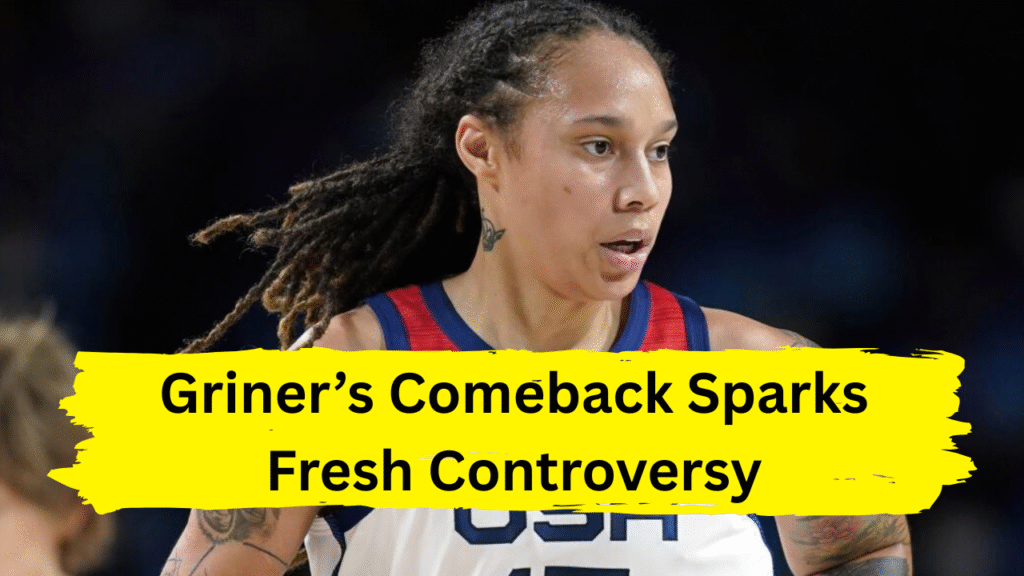Brittney Griner’s story is one of resilience, redemption, and reckoning. From her wrongful detainment in Russia to her polarizing resurgence with the Atlanta Dream, the 6-foot-9 center has become a lightning rod for debates about patriotism, activism, and the price of greatness. As she navigates her 12th WNBA season, Griner’s journey transcends basketball—it’s a mirror reflecting the complexities of identity, justice, and legacy in modern sports.
The Russian Ordeal: A Nightmare That Changed Everything
In February 2022, Griner’s life unraveled at a Moscow airport. Russian authorities detained her for carrying vape cartridges containing medically prescribed cannabis oil—a minor offense in the U.S. but a grave crime in Russia. What followed was a 10-month ordeal marked by grim prison conditions, geopolitical tensions, and a global campaign for her freedom. Griner’s memoir, Coming Home, reveals harrowing details: frigid cells, psychological torment, and the crushing uncertainty of her fate .
Her release in December 2022—via a prisoner swap for Russian arms dealer Viktor Bout—sparked both relief and outrage. Critics lambasted the Biden administration for trading the “Merchant of Death,” while supporters hailed Griner’s return as a triumph of diplomacy. The deal underscored her symbolic weight: a Black, queer athlete thrust into the center of international politics .
The Phoenix Mercury Era: A Comeback Shadowed by Scrutiny
Griner’s 2023 return to the Phoenix Mercury was cathartic. Fans greeted her with standing ovations, and she averaged 17.5 points per game despite the Mercury’s dismal 9–31 season. Named Co-Comeback Player of the Year, she proved her on-court dominance remained intact . Yet off the court, the scars lingered. Therapy sessions, truncated interviews, and a newfound caution marked her post-detainment life. “I’m not the same person,” she admitted, reflecting on the trauma that reshaped her priorities .
Her activism also evolved. Once a vocal protester who refused to stand for the national anthem, Griner now chooses subtler forms of advocacy, leveraging her platform to campaign for other detained Americans like Paul Whelan and Evan Gershkovich . This shift drew mixed reactions: some praised her pragmatism, while others accused her of diluting her voice.
The Atlanta Dream Chapter: Rebirth in the South
In 2025, Griner shocked the WNBA by leaving Phoenix—the only franchise she’d ever known—for the Atlanta Dream. The move wasn’t just about basketball. “I wanted to be somewhere they knew they wanted me,” she said, alluding to the Mercury’s lukewarm commitment during free agency . Atlanta offered a fresh start: a young core, a progressive ownership group, and a city echoing her Southern roots.
Griner’s impact was immediate. At a season-ticket holder cookout, she charmed fans by vaulting fences for donuts and dancing with toddlers. On the court, she embraced a new role as a mentor, schooling rookies on post moves and life lessons: “Going overseas isn’t failure. It’s survival” . Her stat line—21 points and 8 rebounds in a nail-biter against Caitlin Clark’s Fever—proved she could still dominate . But it’s her off-court serenity that stands out: evenings on her porch with wife Cherelle and their son Bash, savoring the “small things” she once took for granted .
The Controversies: Hero or Hypocrite?
Griner’s comeback has been as divisive as it is inspirational. Critics argue her privilege as a star athlete fast-tracked her release, contrasting her case with lesser-known detainees. Others condemn the Bout swap as a dangerous precedent, questioning whether her celebrity skewed moral calculus . Even her activism draws fire. When she urged fans to “keep fighting” for detained Americans, skeptics accused her of performative allyship .
Her on-court persona fuels debate, too. A preseason dunk promise—“👀 I can see it”—thrilled supporters but irked traditionalists who dismiss her as a “gimmick” . Meanwhile, her evolving playstyle—experimenting with three-pointers at a 50% clip—challenges stereotypes about centers, though purists argue it dilutes her physical dominance .
Legacy in the Balance: Catalyst or Cautionary Tale?
Griner’s legacy defies easy categorization. Statistically, she’s a titan: 10 All-Star nods, two Olympic golds, and a 2014 WNBA title cement her as one of the game’s greats . Culturally, she’s a trailblazer—a LGBTQ+ icon who normalized dunking in women’s basketball and challenged norms around race and gender . Yet her story is also a cautionary tale about the risks WNBA stars face overseas, where many play to supplement meager salaries.
The Dream’s investment in Griner—a $165,000 contract and marketing push—reflects her enduring appeal . But as the league grapples with expansion and rising stars like Caitlin Clark, Griner’s role is shifting from centerpiece to elder stateswoman. Her focus now? “Providing for my family and using my voice,” she says—a mantra that encapsulates her journey from prisoner to protagonist .
Conclusion: A Journey Unfinished
Brittney Griner’s comeback is more than a sports narrative—it’s a testament to resilience in the face of unimaginable adversity. Yet her story remains unfinished. Will she lead Atlanta to its first title? Can she bridge divides in a polarized fanbase? And how will history judge a career punctuated by triumph and turmoil?
As Griner herself wrote in Coming Home: “Pressure is a privilege.” For better or worse, she’s carrying the weight of a legacy still being written—one dunk, one game, one controversy at a time .


